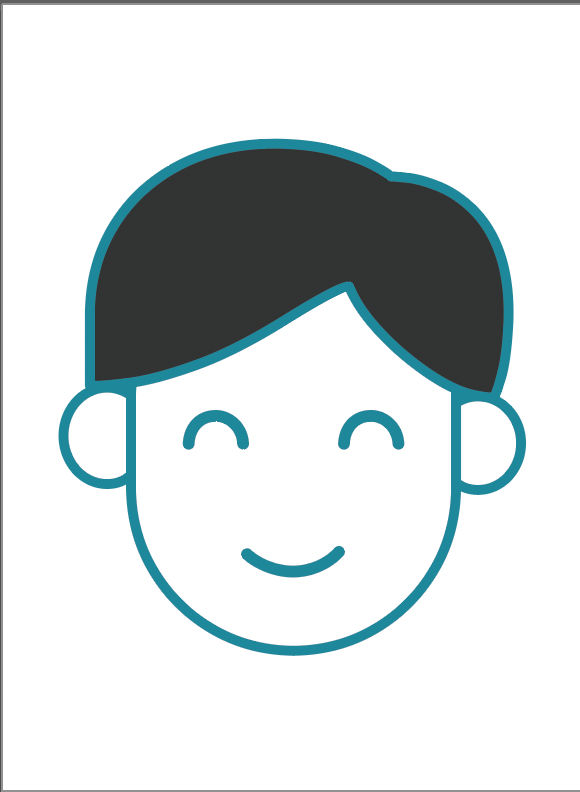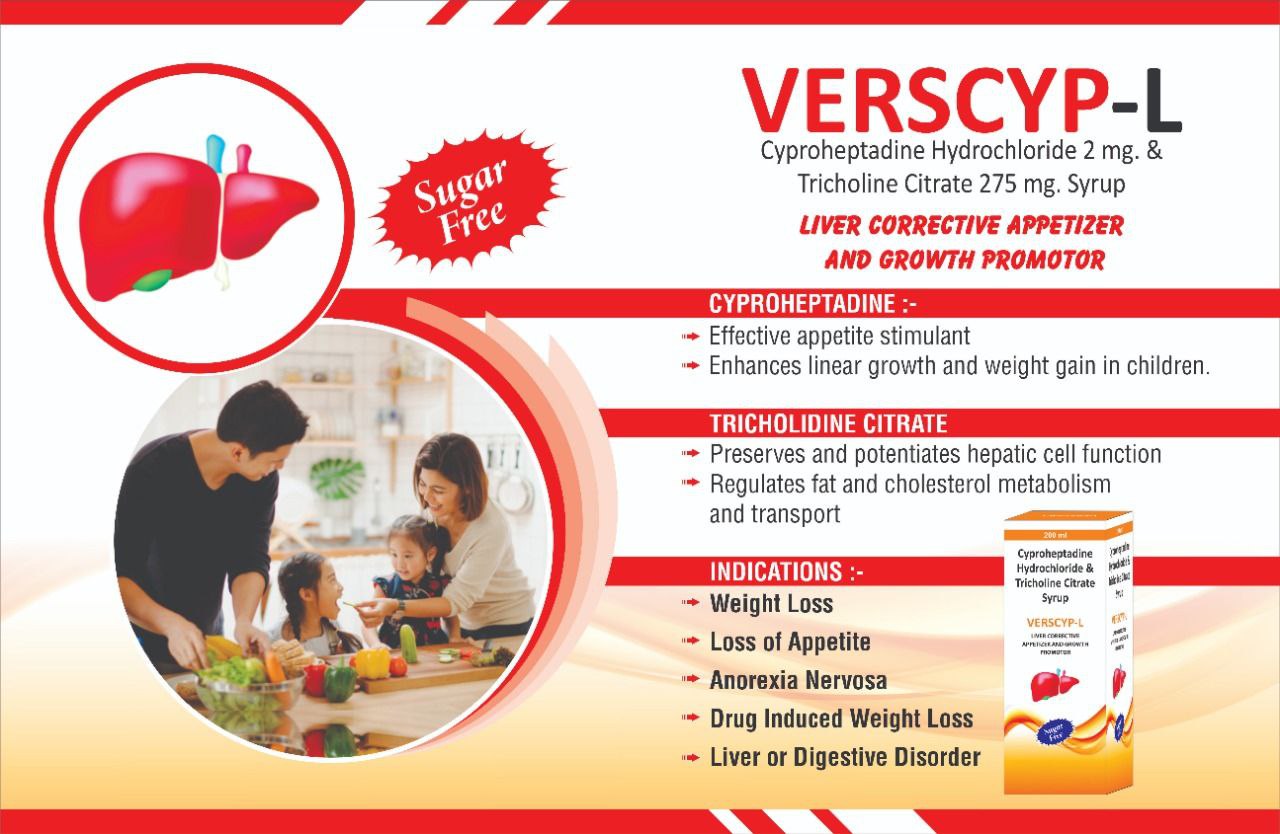About Cyproheptadine+tricholine
Cyproheptadine+tricholine is used to stimulate the appetite and treat alimentary tract and metabolism problems. Cyproheptadine+tricholine helps in the treatment of lack of appetite, weight loss and anorexia nervosa (an eating disorder with low body weight). Besides this, it is also prescribed for underweight children who have an inadequate dietary intake, loss of appetite, anaemia, liver/digestive disorder and as an adjunct to anti-tubercular (anti-TB drugs) and antiretroviral (anti-HIV drugs) treatment for weight gain.
Cyproheptadine+tricholine is a combination of two drugs, namely: Cyproheptadine (antihistamine/antiallergic) and Tricholine (bile acid binder). Cyproheptadine works by reducing the effect of a chemical messenger in the hypothalamus called serotonin, thereby helps to stimulate the appetite. On the other hand, Tricholine is a bile acid-binding agent that works by removing excess bile acid by producing more bile acid utilizing more cholesterol in this process which in turn lowers the fat content in our body.
You are advised to take Cyproheptadine+tricholine for as long as your doctor has prescribed it for you, depending on your medical condition. In some cases, you may experience certain common side-effects such as dry mouth, drowsiness, confusion, and ataxia (impaired balance or coordination). Most of these side-effects do not require medical attention and will resolve gradually over time. However, you are advised to talk to your doctor if you experience these side-effects persistently.
Inform your doctor before taking Cyproheptadine+tricholine if you have asthma, hyperthyroidism, high blood pressure, intraocular (eye) pressure or heart problems. Consult your doctor before taking Cyproheptadine+tricholine if you are pregnant. It is not recommended to take Cyproheptadine+tricholine if you are breastfeeding. Cyproheptadine+tricholine may cause drowsiness, so drive with caution. Avoid consumption of alcohol while taking Cyproheptadine+tricholine as it may cause increased drowsiness. Keep your doctor informed about all the medicines and your health condition to rule out any side-effects.
Uses of Cyproheptadine+tricholine
Treatment of Loss of appetite (anorexia)
Medicinal Benefits
Cyproheptadine+tricholine belongs to a group of medicines called Appetite enhancers used to stimulate the appetite and increase body metabolism. Cyproheptadine+tricholine is indicated for loss of appetite, weight loss and anorexia nervosa (an eating disorder with low body weight). Cyproheptadine+tricholine is also prescribed for underweight children who have an inadequate dietary intake, loss of appetite, anaemia, liver or digestive disorder. Additionally, Cyproheptadine+tricholine is also used as an adjunct to anti-tubercular (anti TB) and antiretroviral treatment (anti-HIV) for weight gain. Cyproheptadine+tricholine helps in stimulation of appetite, ensures weight gain, provides effective hepatoprotective action and enhances protein synthesis. It is also indicated in hepatobiliary disorder (liver disease) associated with anorexia (lack/loss of appetite).
Directions for Use
Take Cyproheptadine+tricholine with or without food. Take the prescribed dose/quantity of Cyproheptadine+tricholine using the measuring cup provided by the pack, shake the bottle well before each use.
Storage
Store in a cool and dry place away from sunlight
Side Effects of Cyproheptadine+tricholine
- Nausea
- Vomiting
- Urine retention
- Dry mouth
- Drowsiness
- Confusion
- Restlessness
Drug Warnings
Do not take Cyproheptadine+tricholine if you are allergic to any of its contents, if you have glaucoma, peptic ulcers, prostatic hypertrophy, bladder neck obstruction or pyloroduodenal obstruction. Inform your doctor before taking Cyproheptadine+tricholine if you have asthma, hyperthyroidism, high blood pressure, intraocular (eye) pressure or heart problems. Cyproheptadine+tricholine may show additive effects if taken along with alcohol, CNS depressants and anti-anxiety drugs. Consult your doctor before taking Cyproheptadine+tricholine if you are pregnant. It is not recommended to take Cyproheptadine+tricholine if you are breastfeeding. Cyproheptadine+tricholine may cause drowsiness, so drive with caution. Avoid consumption of alcohol while taking Cyproheptadine+tricholine as it may cause increased drowsiness.
Drug Interactions
Drug-Drug Interactions: Cyproheptadine+tricholine may interact with an antihistamine (diphenhydramine, cetirizine), antidepressants (duloxetine, fluoxetine, sertraline), anti-convulsant (pregabalin, topiramate), narcotic analgesics (morphine, methadone, oxycodone) and anti-psychotic (quetiapine).
Drug-Food Interactions: No interactions found/established.
Drug-Disease Interactions: Inform your doctor if you have asthma, heart, kidney or liver problems.
Drug-Drug Interactions Checker List:
DIPHENHYDRAMINECETIRIZINEDULOXETINEFLUOXETINESERTRALINEPREGABALINTOPIRAMATEQUETIAPINEMORPHINEMETHADONEOXYCODONE
Safety Advice
ALCOHOLUNSAFEAvoid consumption of alcohol while taking Cyproheptadine+tricholine as it may cause increased drowsiness.
PREGNANCYCAUTIONCyproheptadine+tricholine belongs to pregnancy category B. Consult your doctor before taking Cyproheptadine+tricholine if you are pregnant, your doctor will prescribe only if the benefits outweigh the risks.
BREAST FEEDINGUNSAFEIt is not recommended to take Cyproheptadine+tricholine if you are breastfeeding. Consult your doctor for further advice.
DRIVINGCAUTIONCyproheptadine+tricholine may cause drowsiness. Do not drive or operate machinery unless you are alert.
LIVERCAUTIONDose adjustment may be needed. Consult your doctor before taking Cyproheptadine+tricholine if you have a liver impairment or any concerns regarding this.
KIDNEYCAUTIONDose adjustment may be needed. Consult your doctor before taking Cyproheptadine+tricholine if you have kidney impairment or any concerns regarding this.
 CHILDRENSAFE IF PRESCRIBEDCyproheptadine+tricholine is safe for children above 1 year if prescribed by the doctor.
CHILDRENSAFE IF PRESCRIBEDCyproheptadine+tricholine is safe for children above 1 year if prescribed by the doctor.
Habit Forming
No
Diet & Lifestyle Advise
- Exercise regularly as it helps in increasing your energy expenditure, thereby helps in increasing hunger.
- You may eat more if you are having a good time during your meal. So, try to make mealtimes enjoyable by eating with friends, family or watching a favourite show.
- Change your menu and eat food that you enjoy.
- Try not to skip meals. Make time for eating.
- If you feel eating three times as overwhelming, eat six smaller meals.
- Include calorie-containing beverages in your diet, such as protein shakes, fruit juices, milk, etc.
- Proper management of basic hygiene and bowel regularity can positively affect appetite in adults.
- Setting the alarm for mealtime or posting a meal schedule on the wall could be helpful for adults to remind them to eat.
- Limit excessive snacking in between meal times.
- If you have trouble obtaining, or preparing food or if you have difficulty with limited food choices, try delivery services which deliver fully prepared healthy meals.
Special Advise
- Tell your doctor if you have been taking or have taken anti-depressants (monoamine-oxidase inhibitors) in last 14 days.
- Your doctor may recommend regular eye checkup, as Cyproheptadine+tricholine may rarely worsen the symptoms in people with glaucoma.

